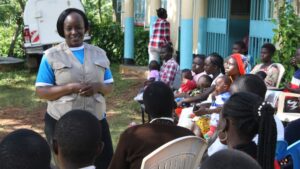Avraham Infeld has a message for North American Jewry: Get your heads out of the sand and don’t be afraid to push Israel in its mission to be a Jewish state.
“We cannot be like ostriches any longer,” he said. “We have to solve our problems together. We can’t do it alone. We gave blood, you gave money — we built a state. Now, we need to work together for our people.
“But we’re like a couple that’s been married for 30 years and the kids are all grown up. We’re looking at each other and saying, ‘Now what? What are you doing in my bed?’”
From Dec. 4-14, Infeld, an acclaimed Jewish teacher, thinker and speaker based in Jerusalem, spoke at 21 different programs around the local Jewish community as part of the 2016 Sue Glick Liebman Visiting Scholar Program.
Named in honor of the longtime Associated leader and Jewish communal activist, the series was designed to educate community members about Israel-Diaspora relations.
On Dec. 12, Infeld spoke about “Israel as a National Home for the Jewish People” to about 30 federation lay leaders — including Liebman and Associated Chair of the Board Linda A. Hurwitz — and agency professionals at the Associated’s downtown headquarters.
Infeld, who in 1967 served as the Jewish Agency for Israel’s first community shaliach (emissary) in Baltimore, admitted to the audience that he was deeply concerned about future American Jewish support for Israel.
“After the Six Day War, Israel became a unifier for American Jews, secular and religious, right-wing and left-wing, committed or not committed Jews. That continued for decades,” said Infeld, 73. “But I’m distressed about the extent of which Israel is now a divisive factor in the Jewish community. I’ve met students here and I see that Israel is a divisive and not a unifying force. It’s very, very serious.
“Israel needs the Jewish community, not just the establishment but the Jews themselves. Israel can’t just depend on evangelical Christians, with whom our leaders spend more time than they do with Jews.”
Infeld noted that in its Declaration of Independence, the State of Israel is referred to in both religious and secular terms.
“What is Israel? Is it the fulfillment of God’s will or modern nationalism? It is both,” he said. “We’re not just immigrating; we’re going back, returning. It’s the in-gathering of exiles. You can see in this document the struggle to live with the two stories of modern Israel. These two stories are what makes Israel complicated.”
The conventional wisdom that being Jewish is merely a religion must be discarded, Infeld charged.
“Some people think it’s a religion or a nationalism, but it’s actually being part of a people – the Jewish people,” he said. “It’s a mishpachah [family]. Jews are not a religion but a people. If you can’t grasp that, you can’t grasp Israel.”
Infeld called on Diaspora Jewry to use its leverage to end the Orthodoxy hegemony on sectarian matters, particularly regarding conversions and “Who is a Jew?” controversies.
“Israel decides which rabbis are kosher to convert people?” he said. “You can’t expect Jews living in America to function like they did living in the ghetto. Things changed. We must talk to each other and rebuild our relationship and not let Israel legislate [who is a Jew]. There’s a battle ahead of us, and we cannot bury our heads.”
He referenced a case in the early years of Israel when a Jewish-born Catholic priest requested Israeli citizenship under the Law of Return and was denied because he belonged to another faith group. Infeld also alluded to an Israeli Supreme Court ruling against an Israeli army officer whose non-Jewish wife and their children did not receive citizenship under the Law of Return.
“There’s freedom of religion in Israel – except for Jews. Israel is constantly dealing with issues about what it means to be a Jew. We have to be the state for all Jews,” he said. “Every Jew should be entitled to migrate to Israel.
“The one thing that is vital is the support of world Jewry. It’s of strategic importance to Israel’s existence. What has to change to rebuild the sense of our relationship? The ability of the Jews of the Diaspora to have a sense of pride in Israel.”
One way to do that, Infeld said, is to promote and publicize Israel’s rapid and heroic responses to emergencies and tragedies around the world. Another is to examine the serious worldwide refugee crisis, he said.
“We are living in an era of the greatest refugee problem since World War II, and we’ll surpass it. Millions of refugees from Syria and elsewhere around the world are fleeing,” he said. “And for the first time in history, there is a mass refugee problem and there are no Jewish refugees. And that’s because there is a state of Israel. Young Jewish people should know this and take pride in it.”
Infeld called on Jewish educators to do a better job of offering a more comprehensive, balanced and varied look at Judaism and Jewish history and culture.
“You have to ask, ‘How do I teach Jewish peoplehood?’ That has to change in the Diaspora,” he said.
Infeld said reaching an accord with the Palestinians is essential to strengthening Jewish pride about Israel in the Diaspora.
“We have to deal with this issue and solve it,” he said. “Every day, Israel is closer to a one-state solution. When we annex these lands and get two million Arabs and don’t make them citizens, that’s apartheid. They have a right to be a state and be a people.”
In addition, after so many years of fighting for the liberation of Jews from the former Soviet Union, Ethiopia and other lands, Israeli and Diaspora Jews need to find a new common challenge, Infeld said.
“That common challenge should be about making humanity better,” he said. “It’s called tikkun olam [repairing the world]. And I’m sure there are other ideas we can come up with for a common challenge.
“Let’s disagree. We’ve disagreed for over 2,000 years. But let’s stop driving away young Jews from the community. They need a place in the community to raise issues and [talk] about Israel. We have to have a vision for the future.”





